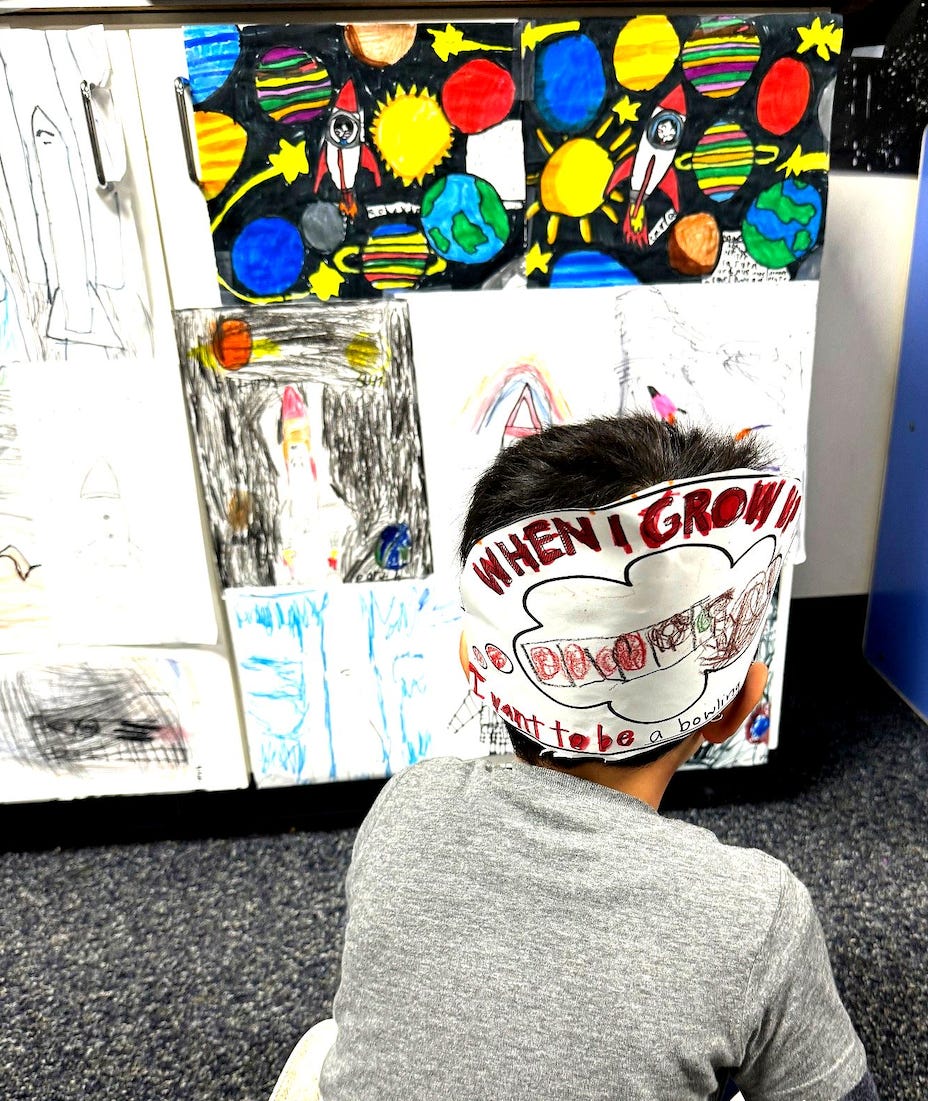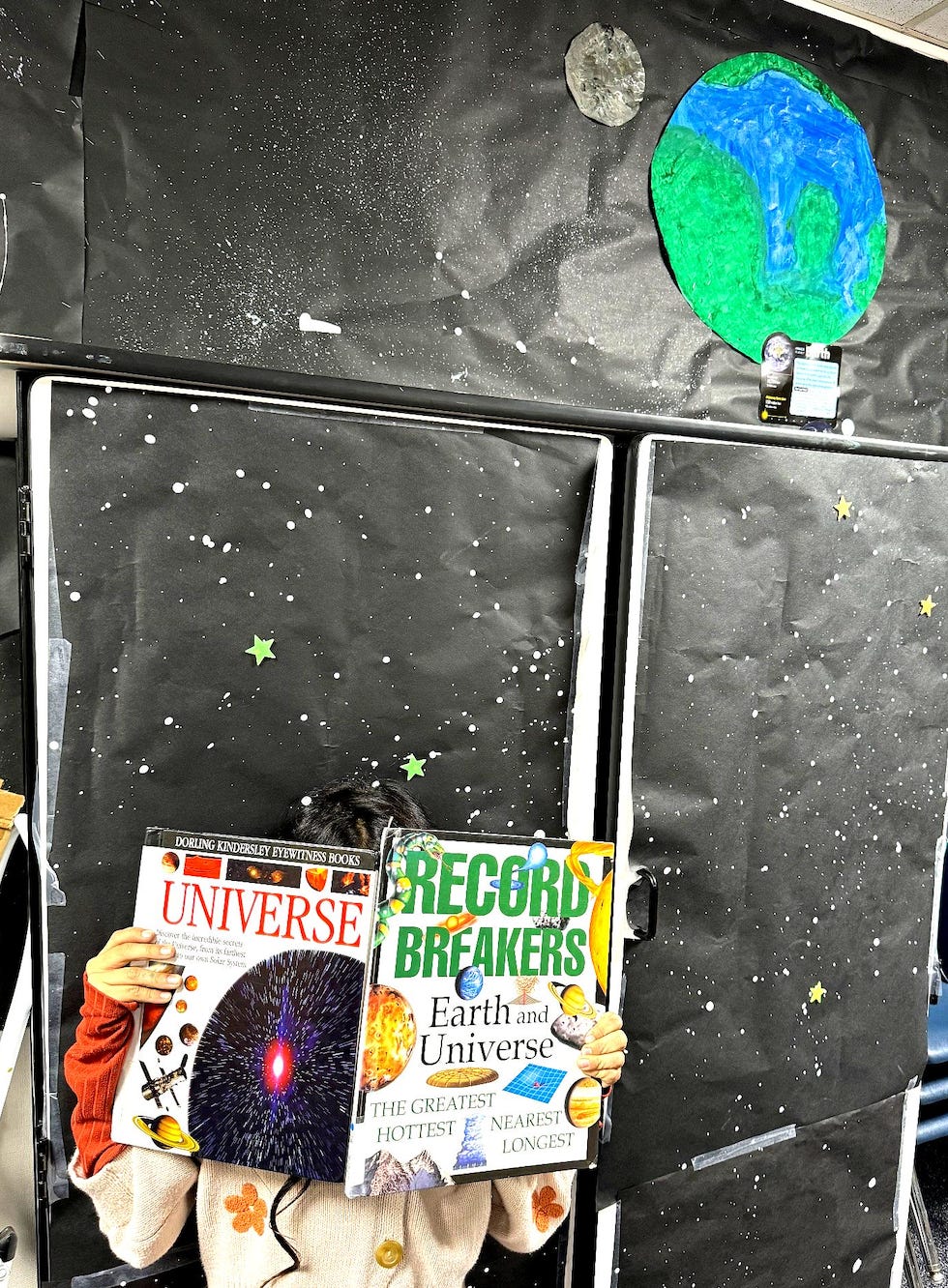Why Space Education Matters
How Learning About Planets Inspires Future Innovators
In just a few weeks, one of my biggest projects of the year will finally come to life—an interactive space exhibition designed to ignite curiosity and excitement about the cosmos. But this isn’t just another classroom lesson. It’s a hands-on, immersive experience where students from TK through 6th grade will step into the wonders of space in a way that feels real and inspiring.
On the final day of this month, over 800 students and parents will walk through our transformed classroom, experiencing space like never before. Teachers have been invited to bring their students for a 20-minute interactive journey, where they’ll engage with:
An interactive light show simulating space travel
Hands-on activities, including building models of Jupiter’s moons
A classroom-turned-space-hub filled with student-created displays
Bringing Space to Life
This project has been a true labor of love. Over the past few weeks—often using my lunch breaks—I’ve worked to turn an ordinary classroom into a mini space exploration center. Students have:
Created an asteroid belt
Learned about planets and dwarf planets
Designed rocket ship murals
Engaged in space-themed activities that make learning fun and meaningful
And so much more.
For me, this exhibition isn’t just about teaching facts—it’s about sparking imagination, creativity, and a love for STEM. But as I got closer to the big day, I found myself wondering:
Was all of this effort really worth it?
I spent countless hours stapling murals to the walls, cutting out planets, and setting up interactive stations. Would the students actually feel the magic of space the way I hoped?
Then, last week, a few students gave me my answer.
Some proudly showed me space books they had checked out from the library. Others handed me drawings they had made just for me. And then, a kindergarten student, an English language learner who had only recently begun speaking English, tugged at my sleeve and held up her picture.
“Look, Mrs. B! I drew us in space together. You see the sun and Saturn?”
That’s when I knew: it was all worth it.
Why Should Students Learn About Space?
Space has always captivated human imagination—from ancient civilizations mapping the stars to today’s missions exploring Mars. But beyond its mystery and wonder, space education plays a critical role in shaping future innovators.
1. It Encourages Curiosity and Exploration
Space is filled with big questions:
How did the universe begin?
Is there life beyond Earth?
What will future space travel look like?
When students learn about space, they’re encouraged to think beyond what they know, ask deep questions, and seek answers—skills that are valuable in any field.
2. It Develops Critical Thinking and Problem-Solving Skills
Space exploration is one giant problem-solving mission.
How do we design a rover that can survive on Mars? How can astronauts grow food in space? Every breakthrough in space science requires innovation, creativity, and critical thinking—the same skills students develop when they engage in space education.
3. It Connects to Real-World Applications
Space research isn’t just about rockets and astronauts. It has shaped everyday technology, including:
Weather forecasting
Medical advancements
Even the cameras in our smartphones
Helping students see these connections makes science and engineering feel real, relevant, and exciting.
4. It Inspires the Next Generation of Scientists and Engineers
Many of today’s space pioneers—NASA scientists, SpaceX engineers, astrophysicists—were once kids who looked up at the stars in awe.
Introducing students to space early can ignite a lifelong passion and even lead them into STEM careers.
5. It Fosters a Global and Universal Perspective
Studying space reminds us that we are part of something bigger. It encourages students to think beyond themselves, beyond their town, beyond even our planet.
It helps them see the importance of:
Global collaboration
Sustainability
Our shared responsibility for the future
The Future Starts with Curiosity
"The future of humanity is in the stars." – Stephen Hawking
When students explore space, they’re not just learning about planets and galaxies—they’re developing the curiosity, resilience, and problem-solving skills needed to tackle real-world challenges.
Whether they grow up to be scientists, engineers, teachers, or creators, space education lays a foundation for discovery, innovation, and imagination.
What do you think?
How has space education inspired you or your students?



